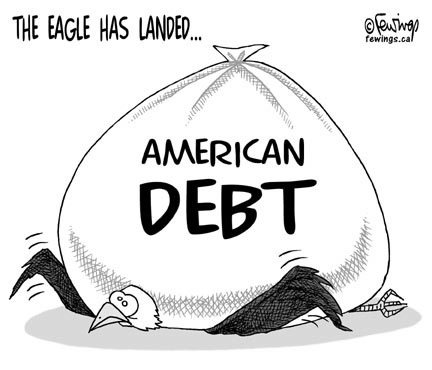The government deficit has ballooned to an all-time, eye-popping high: $14 trillion.
And what does the frightful milestone mean for the average American? A whopping historical record $45,300 for each person.
While the government spending debate has been going on for decades, the upcoming one will center around whether or not Congress will lift the legal debt limit or rework the budget to cut spending in order to stay under the current cap.
The Obama Administration (and most Democrats) are encouraging Congress to pass the bill allowing the increase. They argue it will help protect the American economy from potential disaster.
On Jan. 6, Treasury Secretary Tim Geithner sent a letter to Majority Leader Harry Reid (D-Nev.), encouraging him to lift the ceiling.
“Never in our history has Congress failed to increase the debt limit when necessary. Failure to raise the limit would precipitate a default by the United States,” he wrote. “Default would effectively impose a significant and long-lasting tax on all Americans and all American businesses and could lead to the loss of millions of American jobs. Even a very short-term or limited default would have catastrophic economic consequences that would last for decades.”
While the issue of raising the debt ceiling is under the political spotlight now, it’s not anything new.
The current debt ceiling was raised to $14.3 trillion last year, but under a heavily-Democratic Congress, did not spark nearly the same debate. But in 2006, Democrats – including President Obama – fought against raising the debt ceiling to protest the trillions being spent on the ongoing wars in Iraq and Afghanistan.
“The fact that we are here today to debate raising America’s debt limit is a sign of leadership failure. It is a sign that the U.S. government can’t pay its own bills,” he said. “It is a sign that we now depend on ongoing financial assistance from foreign countries to finance the government’s reckless fiscal policies.”
Now that Republicans –who have promised fiscal responsibility — have a majority in the House, the Democrats are bracing for a tough fight.
Newly-elected Republicans are especially nervous about the vote, GOP leaders told the Wall Street Journal on Friday.
They added while they expected the vote to raise the debt ceiling to pass, the bill would come with significant cuts. What exactly those cuts would be is unclear.
“Do I want to see this nation default? No,” said Rep. Paul Ryan, (R-Wis.), chairman of the House Budget Committee. “But I want to make sure we get substantial spending cuts and controls in exchange for raising the debt ceiling.“
 Thfire.com Everyday news that matters
Thfire.com Everyday news that matters 
